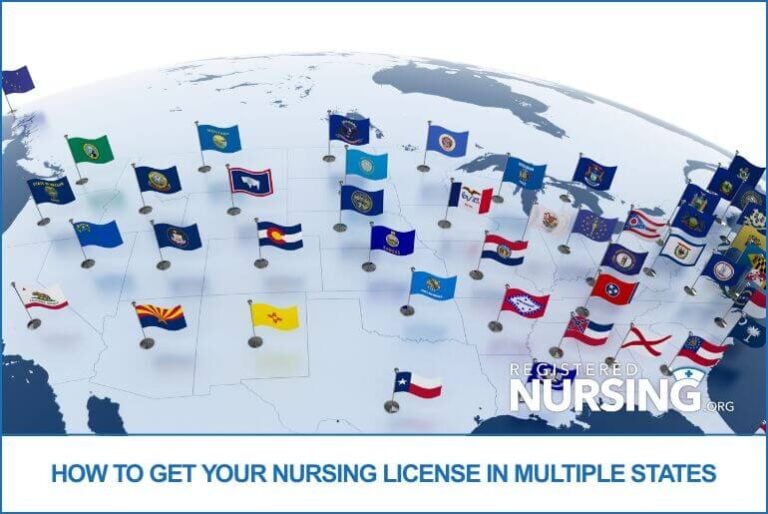How to Get Your Nursing License in Multiple States
- Understanding the Nurse Licensure Compact (NLC)
- Eligibility Requirements for a Multistate License
- Steps to Apply for a Multistate License
- Managing Licensure When Moving Between States
- NLC Member States as of April 2025
- Tips for Maintaining Multistate Licensure
- Take Your Next Step in Nursing
- Latest Articles & Guides

In today's dynamic healthcare environment, the ability for nurses to practice across state lines is more critical than ever. According to the U.S. Bureau of Labor Statistics, employment of registered nurses is projected to grow 6% from 2021 to 2031, adding about 195,400 new jobs. This growth is driven by an aging population, increased emphasis on preventive care, and the expansion of healthcare services. To meet these demands, nurses are increasingly seeking licensure in multiple states, allowing them to practice across state lines, fill critical staffing shortages, and take advantage of diverse career opportunities.
The demand for nursing professionals continues to rise, with projections indicating a nationwide deficit of registered nurses by the decade’s end. To address this shortage and enhance workforce mobility, the Nurse Licensure Compact (NLC) allows nurses to practice in multiple states with a single license. As of April 2025, 43 U.S. jurisdictions have enacted the NLC, facilitating cross-state practice for nurses and improving access to care.
Obtaining a nursing license in multiple states can seem daunting, but with the right information and resources, it becomes a manageable and rewarding process. This comprehensive guide will walk you through the process of obtaining a multistate nursing license, eligibility criteria, application steps, and tips for maintaining licensure across states.
Understanding the Nurse Licensure Compact (NLC)
The NLC is an agreement among participating U.S. states that allows registered nurses (RNs) and licensed practical/vocational nurses (LPN/VNs) to have one multistate license, enabling them to practice in other compact states without obtaining additional licenses. This facilitates workforce mobility and access to nursing services across state lines.
Benefits of the NLC
- Mobility: Practice in multiple states without obtaining additional licenses.
- Efficiency: Streamlined licensure process saves time and reduces paperwork.
- Flexibility: Ideal for travel nurses, military spouses, and telehealth providers.
For example, a nurse licensed in Texas who receives a travel nursing assignment in Florida can begin work immediately, without waiting for an endorsement license. This kind of flexibility allows healthcare providers to respond faster to staffing needs and emergencies, which is especially critical in rural or underserved communities.
Eligibility Requirements for a Multistate License
To obtain a multistate license under the NLC, nurses must meet specific criteria:
- Primary State of Residence (PSOR): Reside in an NLC member state and declare it as your primary state of residence.
- Unencumbered License: Hold an active, unencumbered nursing license in your PSOR.
- Education: Graduate from a board-approved nursing education program.
- Examination: Pass the NCLEX-RN or NCLEX-PN exam.
- Background Check: Submit to state and federal fingerprint-based criminal background checks.
- No Felony Convictions: Have no felony convictions or misdemeanor convictions related to the practice of nursing.
These eligibility criteria are designed to ensure that only qualified, safe, and competent nurses are granted the ability to practice in multiple jurisdictions. Each requirement plays a role in safeguarding patient health and upholding nursing standards across all participating states.
Steps to Apply for a Multistate License
Applying for a multistate license involves several steps that require careful preparation and attention to detail. While the process is relatively straightforward, it’s important to ensure that you meet all eligibility criteria before starting your application. By following your state board’s specific guidelines and preparing the necessary documentation in advance, you can avoid common delays and streamline your path to obtaining a multistate license under the Nurse Licensure Compact (NLC).
Applying for a multistate license involves several steps:
- Verify Eligibility: Ensure you meet all NLC requirements.
- Application: Submit an application through your state’s Board of Nursing.
- Fees: Pay the required fees.
- Background Check: Complete fingerprint-based criminal background checks.
- Documentation: Provide proof of residency, education, and licensure.
- Processing Time: Allow up to 30 days for application processing.
Before beginning the application, confirm that your state participates in the NLC. It’s also helpful to gather all necessary documents beforehand to streamline the process. Many Boards of Nursing offer online applications, and some states may require notarized forms or in-person visits, so check your BON’s specific instructions.
Managing Licensure When Moving Between States
If you move from one NLC state to another, you’ll need to apply for licensure by endorsement in your new PSOR. Your previous multistate license will be deactivated upon issuance of the new license.
It's essential to apply for your new license as soon as possible after relocating. While some states offer temporary permits, delays in updating your license can result in practice restrictions or gaps in employment. Additionally, moving to a non-NLC state will require obtaining a separate license entirely, even if your prior license was multistate.
NLC Member States as of April 2025
| State | Status |
| Alabama | Active |
| Arizona | Active |
| Arkansas | Active |
| Colorado | Active |
| Connecticut | Pending (10/01/25) |
| Delaware | Active |
| Florida | Active |
| Georgia | Active |
| Idaho | Active |
| Indiana | Active |
| Iowa | Active |
| Kansas | Active |
| Kentucky | Active |
| Louisiana | Active |
| Maine | Active |
| Maryland | Active |
| Massachusetts | Pending |
| Mississippi | Active |
| Missouri | Active |
| Montana | Active |
| Nebraska | Active |
| New Hampshire | Active |
| New Jersey | Partial |
| New Mexico | Active |
| North Carolina | Active |
| North Dakota | Active |
| Ohio | Active |
| Oklahoma | Active |
| Pennsylvania | Partial |
| Rhode Island | Active |
| South Carolina | Active |
| South Dakota | Active |
| Tennessee | Active |
| Texas | Active |
| Utah | Active |
| Vermont | Active |
| Virginia | Active |
| Washington | Active |
| West Virginia | Active |
| Wisconsin | Active |
| Wyoming | Active |
| U.S. Virgin Islands | Pending |
Note: “Partial” indicates limited implementation; “Pending” indicates future implementation.
The NLC continues to expand, with several states in the legislative process of joining. Staying up-to-date on the status of your current and prospective states is crucial for planning your nursing career effectively.
Tips for Maintaining Multistate Licensure
Maintaining your multistate license involves more than just renewing it on time. Staying compliant with both your home state’s regulations and any practice state-specific requirements is essential for uninterrupted nursing practice. Because laws and guidelines can change, staying updated through your state board and reputable nursing organizations is critical. To ensure your multistate license remains active and in good standing:
- Stay Informed: Regularly check your state’s Board of Nursing website for updates.
- Renew Timely: Adhere to renewal deadlines and requirements.
- Report Changes: Notify your Board of Nursing of any changes in residency or contact information.
- Continuing Education: Complete any required continuing education courses.
In addition to meeting home state requirements, be aware that some states where you practice may have mandatory reporting or compliance expectations. Document your CEUs and license numbers accurately to avoid potential issues with verification or audits.
Take Your Next Step in Nursing
Obtaining a multistate nursing license opens doors to diverse opportunities, from travel nursing assignments to telehealth roles. By understanding the NLC and its requirements, you can expand your practice and meet the growing healthcare needs across the country. Stay proactive in managing your licensure, and you’ll be well-positioned for a dynamic and fulfilling nursing career.
Sources
- Nurse Licensure Compact Overview
- NLC FAQs
- Moving Scenarios Factsheet
- U.S. Bureau of Labor Statistics – Registered Nurses
- American Association of Colleges of Nursing – Nursing Shortage Fact Sheet
Latest Articles & Guides
One of the keys to success as a registered nurse is embracing lifelong learning. Our articles and guides address hot topics and current events in nursing, from education to career mobility and beyond. No matter where you are on your nursing journey, there’s an article to help you build your knowledge base.
Browse our latest articles, curated specifically for modern nurses.



